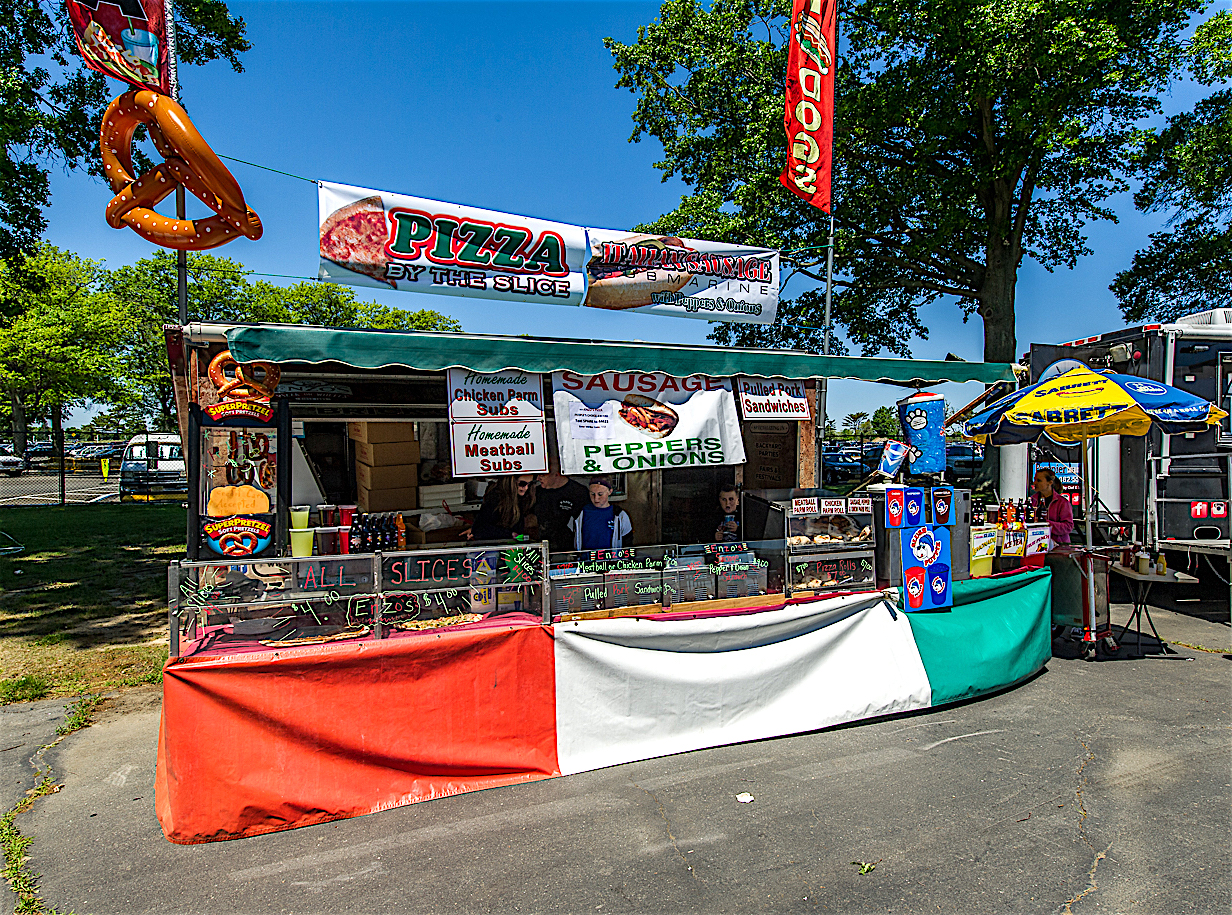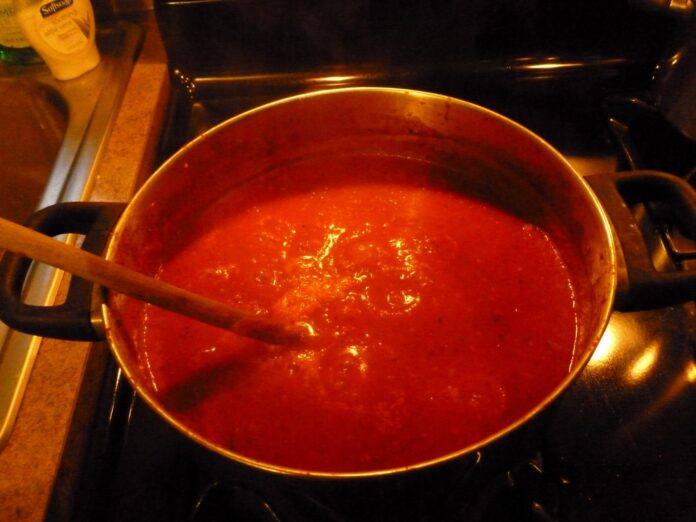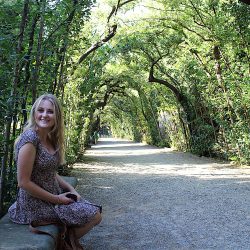
Reconciling my American, my Italian and my hard-to-verbalize identities
I.
I woke up to the smell of Pledge cleaner, Windex and the stereo blasting Dean Martin’s greatest hits. It was a Saturday, and these things were part of my mother’s routine.
She’d make coffee and have a cigarette. Then it was time to clean the house — a family activity that both of my older sisters managed to avoid. My job, as a seven-year-old, was to sweep the floor.
“When the moon hits your eye like a big pizza pie, that’s amore,” I sang along to the music, while twirling the broom.
My mother turned the stereo up.
Even though we were cleaning during the peak hours of Saturday morning cartoons, I didn’t care. I was with my best friend: my Italian mother.
Sundays were even better.
My mother would do her usual coffee and cigarette routine. I’d wake up a little later, at around 10.
But instead of waking up to the smell of cleaning products, I’d smell the rich savory scent of Sunday sauce.
By 11 a.m. I was covered in flour, helping my mother cut the gnocchi we’d just made. I placed the pillowed dumplings on a red and white tablecloth, to let them set.
My mother never said much while she cooked. There was always a comforting silence in the kitchen, as I rolled the dough out and stared at my mother’s expert hands.
“Okay, we throw the pasta later. Go get clean up,” she’d say, while wiping the excess flour off the counter.
Sundays with My Parents
By noon I’d be starving. The kitchen would be empty. My mother had gone to smoke another cigarette on the deck. I knew I had little time, so I’d grab a chair and push it over to the stove. Dipping a piece of bread that I found on the table into the deep pot of simmering sauce, I thought I was in the clear.
“Ma, che stai facenn’!” My father’s coarse voice bellowed out from behind me. Startled, I dropped the whole piece of bread into the sauce. I knew it was over.
“Get down now! You’re gonna fall!” my father yelled. I stepped off the chair and shut my mouth. There was no point in arguing with my father while he continued to spout phrases in Napoletano. I didn’t understand them, but I knew they weren’t good.
My mother returned to the kitchen.
“Rosa’ non fa schem.’” ‘Don’t be stupid’ she told him, before walking over to the stove and reaching for the piece of bread I’d just dropped into the sauce. She wrapped it in a napkin and gave it to me.
“Mangia.”
I took the bread and ate it. My father patted my head with his calloused hand.
“Next time, tell me and I get it,” he said.
II.

The first time I was embarrassed about having immigrant parents was in middle school.
I was briefly on a recreation softball team. I wasn’t very good, but my mother was there at every practice, and game.
One day she volunteered to work the snack stand during a home game. I was sitting on the bench in the dugout when I overheard a fellow teammate, of whom I was not very fond, talking loudly to her girlfriends.
“Is that weird lady with the accent Sabrina’s mom?” she pointed toward the snack stand.
Her group of minions laughed.
“Well, that explains a lot,” she snickered before stuffing a fistful of bubblegum into her mouth.
I remember the feeling of shame in my stomach.
Why does my mom still have an accent? She’s been here for over 30 years! Why can’t I just have a normal mother who doesn’t sound like she’s slow?
I struck out the next time I was up at bat.
“I don’t want you at my games anymore,” I said to my mother on the car ride home.
“Che?” she asked.
“I just don’t want you there, okay? You’re embarrassing. No one understands you,” I grumbled under my breath, half hoping she hadn’t heard me. But, in the rearview mirror, I saw her face drop. Then I heard anger in her voice.
“You’re embarrassed?” she asked, in what I like to call her Robert De Niro inflection voice. “I don’t care. I’m your mother, you are my daughter and we are Italian. You don’t forget that. Don’t listen to what anyone else says.”
I rolled my eyes and kept staring out of the window, “Whatever.”
To the Dome of Fire
Senior year, as I was supposed to be presenting my project on Lord of the Flies to my AP senior English class, I could feel my face turning red.
I’d decided to use William Blake’s poem “A Poison Tree” to illustrate the similarities of evil and temptation. But, in front of the class, I was reminded that even though I adored reading and writing, my public speaking skills were deeply rooted in the household where I grew up.
Whenever my parents directed me to do something, they would either say it in Napoletano, or in their own version of English.
“Go get the thing in there, and put that other thing over there.”
A normal person would ask questions. They would wonder what the “thing” was and where it was supposed to go. But I knew that I just had to figure it out. The “thing” stood for many things: the remote control, the vacuum, the garbage, the broom, the wooden spoon. It was always any “thing” and everything.
At school, I’d be amazed when my classmates used proper names of objects and events. I was intimidated and self-conscious about my language skills, and blamed my parents.
During my “Lord of the Flies” presentation, it was no different. Though I was looking at my notes the whole time, I continued to stammer away, trying to conjure forth my point.
“And when they put the thing on the spear—” I said before my teacher interjected.
“What thing?” my teacher raised her eyebrows.
“I meant the pig’s head,” I said before lowering my eyes to the floor. Can this damn presentation be over yet?
“That’s what I thought,” she said.
III.

In college, something happened.
I actually wanted to learn more Italian, especially since I was the only one in my family who couldn’t speak it fluently. I was disconnected — so I made it my mission to become connected.
In my freshman year, I decided I was going to minor in Italian.
“I got this. It’ll be an easy A,” I told my roommate.
On the first day of my 8:10 a.m. class, my professor read my last name, and started firing questions at me in proper Italian.
I stared at her blankly.
This is going to be hard.
It turned out that the Italian grew up with wasn’t Italian at all.
But I studied my way through it. I practiced my pronunciation every night, despite my roommate looking at me like I was nuts.
“Piacere di conoscerrrr-La,” I said at my dorm room desk, exaggerating my “R” sounds.
“It’s 12 a.m. Can you give it a rest already?” my roommate asked icily. But I pressed on.
I got those A’s. And after three semesters, I knew I wanted to challenge myself even more. I remembered, from those Sunday mornings when I helped my mother with the cooking, the four-foot framed map that hung on the wall by the stove. It included practically every city, waterway, and region of Italy. Along the edges were tiny blurbs about famous cities, such as Rome, Venice, Sicily, and Naples. As a girl, my eyes had always been drawn to the blurb with the picture of the orangey dome.
When I was tall enough to reach the bottom of the frame, and finally learned to read, the words Duomo di Firenze stood out. I had no idea what a duomo was and I remember thinking that Firenze sounded like fire. I imaginatively dubbed it “The Dome of Fire.”
My title was squashed as soon as my mother caught me staring at the picture.
“Il Duomo di Firenze, the Cathedral of Florence,” she said before going back to rolling and slicing the gnocchi for our dinner.
Florence.
That’s where I had to go. I started to romance the idea of what it meant to be Italian. I was going to eat Pizza Margherita in a piazza, and spout Italian phrases like it was nothing. I was going to experience what it meant to have true independence, and to finally get out of the bubble that is Central New Jersey. I was going to view the world as any typical Italian would — with passion and pleasure and a disregard for protocols of ways to dress, eat, act and feel.
And I went.

So, How Do I Fit In?
September 29, 2014
Study Abroad blog post
Via Gino Capponi, 30
Florence, Italy
While I am having fun, that’s not entirely the whole truth. You see, I’ve sort of been having an internal, cultural struggle.
On the one hand, I was raised Italian. I understand a lot of the language. The RAI [the Italian state TV network] has been a main source of news in my house for decades. I know that it’s called sauce and not “gravy.” I know the difference between really good Italian food and really crappy Italian food, ahem, Olive Garden. I know that soccer is a religion. And I can identify with those who feel extreme pride when it comes to their Italian heritage.
But I am also American. I like to eat hamburgers and French fries and barbecue. I speak English. I watch football and baseball (at least when the Giants are in the Superbowl and the Yankees are in the World Series). I don’t like walking everywhere. I enjoy variety and products in bulk.
And so, here’s the question that keeps popping into my head every time I walk the streets of Florence: where and how do I fit into this whole experience?
Even though I try my hardest to immerse myself in the Italian culture here in Florence, I inevitably feel left out and like I don’t belong. I’m forever floating in this gray area between being Italian and being American.
Of course, the obvious answer as to why I cannot fully identify with being truly Italian is because I still am light years away from being fluent. Also, I didn’t grow up with proper Italian. My parents are both from Naples. They speak the Napoletano dialect – the complete opposite of the Fiorentina dialect, which is the basis of proper Italian.
To me, the Napoletano dialect has a certain heartiness and a more playful persona than proper Italian. Don’t get me wrong, the Italian language, in my opinion, is one of the most beautiful languages to speak and to hear. But it’s like choosing between eating a tasting menu at a three star Michelin restaurant or eating home-made ragu at a simple, family-run trattoria.
And when I visited my grandparents this past weekend in Agropoli, a beach town about an hour outside of Naples where, you guessed it, they speak Napoletano, I remembered the reason I came to Italy in the first place. After seeing this view from my grandparents’ balcony and eating a huge meal prepared by my grandmother (who recently got her hip replaced, yet refuses to sit in one spot), I looked around the empty house at old family pictures of my mother, my aunt, my sisters, my uncles, and my cousins. Then, it hit me.
I came to Italy because I wanted to find a way to not only connect with my cultural roots, but to connect with my family.
Family.
It’s one of those answers you feel stupid for not knowing in the first place because it is so simple.
And so, I didn’t need to feel guilty that I was American or that couldn’t fully speak proper Italian with my grandparents. They didn’t speak it anyway! This past weekend, I was able to switch back and forth between not only English, but dialect, and proper Italian for the first time. It was a great feeling. I was in the gray area, and I didn’t feel like an outcast.
The day and a half that I stayed in Agropoli with my grandparents, eating delicious food and spouting phrases in both Italian and dialect, was probably one of the most special moments I’ve had on this trip so far. I feel like it was the first of many mini epiphanies to come. I returned to Florence recharged, and more accepting of where I am in the grand scheme of things.
I am not only Italian. I am not only American. I’m both — with a little touch of Napoletano.
When I wrote that blog post in the kitchen of my Florentine apartment at midnight, I was crying and laughing at the same time. Three thousand miles from home, I’d found what I was looking for. It had been in front of my face the whole time.



